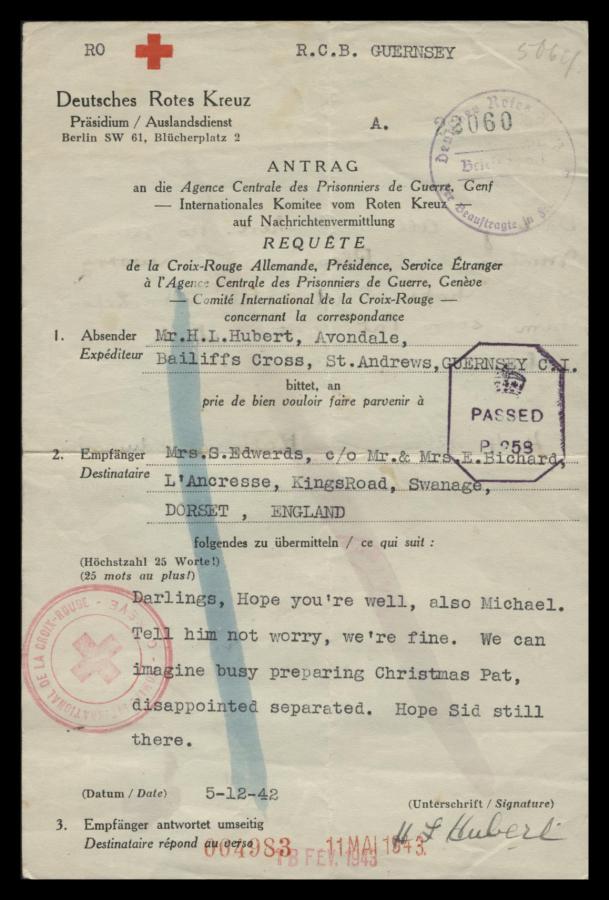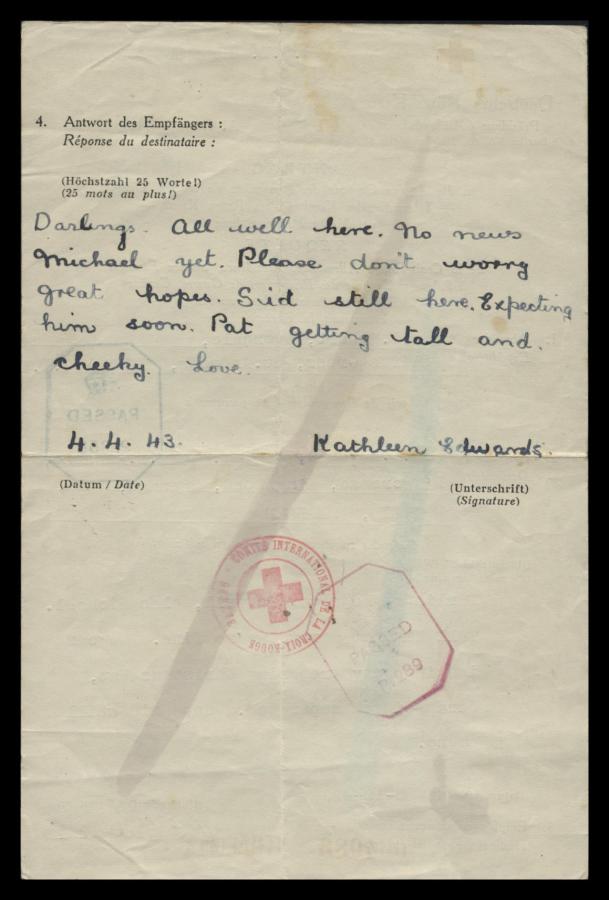From Guernsey with love
After watching the movie ‘Guernsey Literary and Potato Peel Pie Society’, set on Guernsey during it's occupation by Germany in the Second World War, Curator of Private Records, Kerrie Leech wondered what material related to this event might be held in the Memorial’s collection.
Kerrie was pleasantly surprised to find the collection of British Army soldier, Private Michael Stephen Hubert.
Hubert was born in Guernsey and joined in the British Army in 1940. On 29 September 1941 he embarked for Malaya, and was taken prisoner of war when Singapore fell in February 1942. Initially interned in Changi for 15 months, he was sent to Thailand in May 1943 to work on the Thai-Burma Railway. In December that year he returned to Singapore; initially to the Sime Road camp then Changi Goal, where he worked on the construction of the aerodrome at the old Changi army camp.
Much of Hubert’s collection describes his POW experiences, such as the extensive and detailed handwritten diaries he kept and the various souvenirs he accumulated. The inclusion of postcards and letters demonstrates the difficulties of communication from the perspective of both a prisoner of war, and that of the people on the German occupied island of Guernsey.
During Hubert’s term of internment he was only able to send a few prisoner of war postcards to his family, most of which took many, many months to reach them. After the fall of Singapore, the family had received word that Hubert was missing, believed killed. It was 18 months before his mother received the very welcome, but nevertheless disturbing news, that Hubert was alive and a prisoner of war of the Japanese. Communication in the other direction was equally as difficult but for different reasons. Mail from Guernsey was under the control of the Germans, and had to be sent via the German Red Cross. Messages were restricted to 25 words. So communication between Hubert in Malaya, his mother in Guernsey and his sister in England, was infrequent, brief, censored and slow.


Messages between Michael's mother in Guernsey and sister in England were sent via the German Red Cross and were restricted to just 25 words.
Following the liberation of Guernsey in May 1945 and Hubert’s liberation in August 1945, he and his family were able to exchange a number of air mail letters. In a letter from his sister, dated 22 August 1945 she says:
‘The news we have all waited for has come at last. Now we are waiting for your cable. We know that you were OK up to March, am now patiently waiting for further good news. We hope that you are in good health and haven’t suffered too much. Well Mick, I arrived back home three weeks ago, and have been amazed to see how the people looked.
Well, Mum, Daph and Matt haven’t changed at all. In fact Bailiffs Cross [the town in which they lived] hasn’t changed at all. Mum managed to save all my furniture and linen and we have even had our wireless back. Harold is trying to put it back in working order.
Did you receive many cards from me, I wrote every fortnight to you. I was staying with Sid at Grimsby when I heard you were missing. I kept the news from Mum for a long time till someone let the cat out of the bag. It was 18 months after that I got the news you were a prisoner of war, was I glad…’
And a letter from Hubert to his mother, dated 7 September 1945.
‘Dear Mum, Daph, Kath and family,
Thank God for watching over me and bringing me out alive and safe. After all this miserable long wait of over five years, I can at last write fully and freely to you, to let you know, I’m healthy, safe and well, free and back in British hands once again. It has been a sad and monotonous time away from you both and I’ve missed you all very much, I do hope you are both health and strong.
I do hope that they’ll get a move on out here and get us back home quickly for I’m longing to see dear old Bailiffs Cross again.
It’s been a waste of precious years, particularly as you’ve been through the same business yourself. Who would have thought that our happy little family would have been broken up and separated like this, for so long. Still we’ve come through it all and I am very thankful to the One Above for guiding us safely through.
Well Mum, I’m waiting to hear all about your health, and present circumstances and of those many evil things which have spoilt your lives in the past few years…
I’ve learnt many lessons which I’ll never forget. I’ve learnt to eat anything that’s put in front of me and you’ll find me easy to please and satisfy for I’ll tackle anything now. However, I’m longing for a feed of tomatoes, gache [a local Guernsey sweet bread dish made with dried fruit] and a dinner of ormer [type of seafood] when possible…
Well Mum, just wait a little longer and then I’ll be back again in the old armchair.
Won’t we have a tremendous amount of things to talk about. Once we start talking, I don’t think we’ll ever stop.
Remember me to all the family, relatives and friends and tell them I’m on the way.
Cheerio, for now, a little more patience.
All my love. Mick.’
Also in this collection are many news clippings relating to the return of prisoners of war to Britain after the war. There is an article written about Hubert from the ‘Guernsey Evening Post’, dated 12 October 1945, it describes the joy and relief of his mother at having her only son returned to her after 3 ½ years in Japanese hands, and goes on to describe some of his war time experiences.
Michael Hubert arrived home in Guernsey on 10 October 1945 and in later years migrated to Australia, living out his remaining days in Sydney.